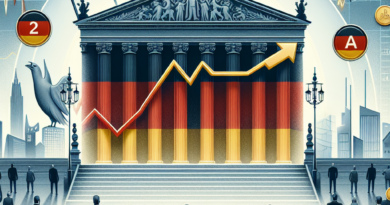Markets Recovering: Economists Deem US Recession Fears “Exaggerated”
Global Markets React to Recent Volatility
Following the turbulent events in the markets on Monday, global markets have shown signs of recovery and a decrease in recession fears in the USA, at least for the time being.
Yesterday, stock exchanges around the world experienced a significant multi-year record decline, with double-digit losses in many major markets.
Over $2 trillion were wiped out from US stock markets yesterday alone.
This steep drop raised speculations about a potential emergency meeting by the Federal Reserve, a move that hasn’t occurred since the early days of the COVID-19 pandemic.
However, on Tuesday, a general repurchase trend brought the situation back to normality.
Tokyo’s Nikkei surged by 10.23% following a 12.40% loss the day before.
The Dow Jones and the NASDAQ 100 also saw increases of 1.20% and 1.90%, respectively.
Tuesday morning, the S&P 500 index, tracking the 500 largest US companies, recorded a rise of 1.76%.
For now, the crisis seems to have been averted.
The apparent drop merely corrected the significant overvaluation of certain market trends, including interest rates and AI technological developments.
The negative trend began last week when major tech companies reported their quarterly earnings, and the Federal Reserve kept interest rates steady.
Companies like Alphabet, Microsoft, and Amazon heavily invest in AI research and development, but their latest earnings indicate that costs might be higher than what Wall Street had hoped for.
The enthusiasm for AI has been the driving force behind the strongest growth of the S&P 500 index in decades, mainly led by the “Magnificent 7” tech stocks.
Additionally, markets anticipate the Fed to lower rates starting in early 2024.
The Fed’s decision to postpone the initial cut to September has raised concerns about a potential US recession.
“It seems like a healthy market correction that has been anticipated for a while,” stated Antonio Cavanero, Generali Asset Management’s head of investments, to the Financial Times.
“The painful areas lie in those transactions based on cheap financing in the Japanese yen space and in technology.”
**Read also: [Is the Yen Behind the Tech Stock Sell-Off?](https://www.examplelink.com)**
Yesterday’s headlines were dominated by the word “recession” as investors worried that interest rates had been kept too high for too long.
In July 2023, the Federal Reserve raised rates to 5.25-5.5%, where they have remained since.
However, with inflation seemingly stable around the Fed’s 2% target and the US economy starting to show strain, markets believe rates should start descending.
Unemployment has seen a slight uptick in recent months to 4.3%, and the GDP growth in the second quarter was slower compared to the same period last year.
Nonetheless, a rate cut in September appears well-timed for most analysts.
Irrespective of market beliefs, the economy is performing well, and there is no rush to lower interest rates.
The Federal Reserve of Atlanta forecasts a 2% GDP growth in the current quarter, and unemployment remains close to historic lows.
Most economists have ruled out an emergency rate cut to “calm” the markets.
“If the Fed were to do an emergency cut, that would signal panic,” remarked Yale economics professor Ernie Tedeschi.
(Source: Money.it International Edition, published on 2024-08-06 at 18:40:25.
Original Title: Markets rebound as economists call recession fears «overblown»)



